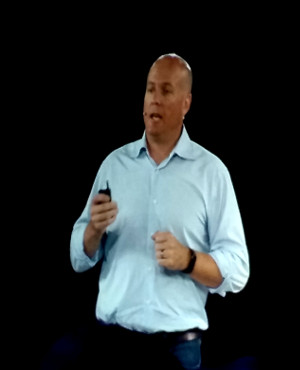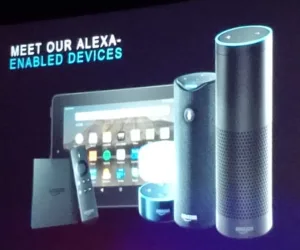 Charlie Kindel, the Director of Alexa Smart Home at Amazon, gave a thought provoking keynote speech at CEDIA. His main message was that computer interaction must and will move beyond the keyboard and mouse. Voice is the natural successor and the maturing of the ecosystem is now such, that he things the next user interface revolution – with voice at its heart – is about to get underway.
Charlie Kindel, the Director of Alexa Smart Home at Amazon, gave a thought provoking keynote speech at CEDIA. His main message was that computer interaction must and will move beyond the keyboard and mouse. Voice is the natural successor and the maturing of the ecosystem is now such, that he things the next user interface revolution – with voice at its heart – is about to get underway.
The Voice User Interface (VOI) follows other major innovation cycles in computing. We started with character mode, moved to a graphical user interface, followed by the web revolution and now the mobile revolution. VOI is next.
Why, he asked? Because our customers are saying so and speech advancements are now in the steep growth part of an exponential curve.
Others see the same writing on the wall – think Apple HomeKit/Siri, Microsoft’s Cortana and the new Google voice platform.
Kindel then explained a little about the Alexa voice engine that Amazon has developed and the Alexa-enabled products that are now in many homes. It started three years ago with the Amazon Echo. This is a cylinder-type device with speakers and very sophisticated microphones and signal processing that can capture voices from across the room even in a noisy environment. There is now an Echo Dot – a smaller version that is now available in 6-packs and 12-packs to fill your house. Interfaces are via tablets (new at CEDIA) and the FireTV remote. Alexa is a cloud-based service so all the processing resides there.
But the real innovation is the “deep learning” to come after the speech has been recognized as Alexa must then decide to do something based on the context of the speech. These can be simple commands like turn on the lights or more emotional commands like, “I’m cold”. If it is daytime, Alexa may open the shades, or if nighttime, it may close the shades and turn on the furnace.
“At Amazon, we like to write the press release for the product we want to create, then develop the technologies to fulfill the promise of the press release,” stated Kindel. “With Alexa, this dream was to create an interface that was very much like the one you see on Star Trek, but for the home.”
He sees Alexa being the hub that can help manage your home, help you shop, play music and video, control your schedule and devices. At CEDIA, Amazon was there to help the custom installation channel learn about Alexa and to start to build it into smart home applications. Kindel sees this channel and the smart home as the vehicle for ‘making the revolution come true;. “We want to partner with all of you,” he said to open the keynote.
He then introduced executives from Lutron and Crestron who said they plan to integrate Alexa into products. Nucleus is a start up he introduced that has a video intercom solution for intra-house or house-to-house communication, which they think is a great way to stay connected with family members. Having the Alexa-based API is the key to building custom experiences – and Amazon wants to get this in the hands of system integrators. – CC
Analyst Comments
I’m a member of a private list of extremely geeky, mostly US-based technology journalists, most of whom could be described, politely, as ‘mature’. Several of them have bought into the Echo and are surprisingly positive about the experience and the usefulness of the system. You can find the comments of one of them here. Amazon has just started selling the Echo and Dot in the UK. Tempting…. (BR)

